March-April 2007
'ICHTHYS' As A Way To The Lord
By Father Raymundo T. Sabio MSC
The author is now serving in the Marshall Islands after many years in South Korea where he was a chaplain in these fields: Apostleship of the Sea; the welfare of foreign workers; Incheon International Airport. His brother, Father Generoso, ‘Gene,’ is now based in the USA (San Bernardino, California) after having worked for six years as Third Assistant General of the MSCs in Rome. Father Gene has a website at http://web.tiscali.it/gene.sabio while Father Raymundo, ‘Ray,’ has two:www.geocities.com/haeyangrts/AoS.html and http://m-jpic.tripod.com/raysabio
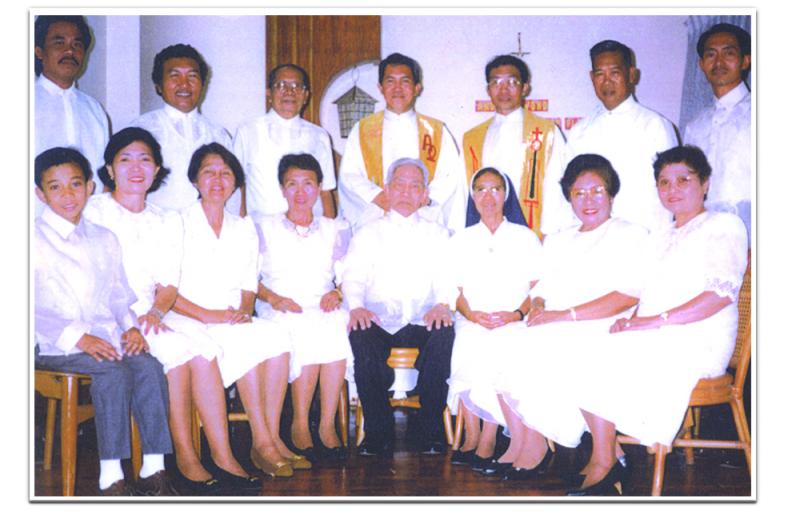
The author, standing fourth from left, during their family reunion in 1994
The New Testament contains many references to the realities of rural life. Cattle and wolves, goats and sheep, vineyards and cornfields, the lilies of the field and the mustard seed, the sea and the lake, bread and wine, trees and rivers, stone and mud, and so on. But one important thing seemed to be of special interest to Christ: the fish, ‘ICHTHYS’, in Greek. A number of Christ’s miracles had something to do with fish.
Fish tales
Christ selected fishermen as his first apostles; he often went with them on their fishing trips. And at one point, he designated Peter, and likewise all the apostles, to be ‘fishers of men’. No wonder that in the early Church, especially during the period of persecution, the fish, ichthys, became the secret symbol of Christ for the Christian Community.
The life of my third eldest sister, Angelica Taco Sabio, also had something to do with fish. She was born on 23 November 1935 in Sta Clara, Oton, Iloilo, and was six when World War II came to the Philippines. She has a very clear memory of the war.
One thing she remembers very well is the great difficulties associated with a semi-nomadic life because of constant evacuation, compounded by an unavoidably absent father. At times, she had to be placed in a basket, her younger brother, myself, in another, both tied to the shoulder-pole that Ilonggos call a ‘tuwang-tuwang’ and carried by a relative to an evacuation site.
In the early part of the war, my mother and her children experienced gradual rejection by the village people because my father was a sergeant in the USAFFE (US Army Forces Far East). At that time, the Japanese invading forces were gradually becoming very cruel to the families of the soldiers as well as to those who sheltered them.
Sanctuary in the mountains
So, my maternal grandfather, Elias Taco, a fearless and resourceful person, searched for a place higher and deeper in the mountains and finally found a favorable spot in the area called Badbaran. He constructed a small hut where he, my mother and her five little children, my aunts and my cousins could stay; there was a cave nearby where the clan could hide in case of attacks by the Japanese.
Life was very crude and miserable; they had root crops and clover leaves, malunggay, for food. At night, they could hear the terrifying howls of wild animals and the sound of big rattlesnakes. The experience of war made all my older sisters and brother, Maria Fe, Lourdes, Angelica, Ramon and Nenita, more courageous, resourceful and decisive, possessing a good deal of perseverance and determination.
After the war, my father was honorably discharged from the military and in 1950 decided to transfer his family to the neighboring province of Negros Occidental. After a number of short stints in various manual and menial jobs, he finally settled in the town of Binalbagan.
In pursuit of a dream
In March 1956, my sister Angelica graduated from high school. She wanted very much to study nursing in Bacolod City but the financial constraints of the family prevented her from pursuing her dream. Instead, she got employed as a pharmacy clerk at the Horvel Drugstore with a salary of P80 per month.
In 1957, Binalbagan Catholic High School was opened by the Columban Fathers, with Fr Patrick Hurley as Director. So, Angelica’s younger siblings could start their high school studies. Her meager salary significantly helped the family to partly meet the financial obligations involved. Much later, her salary was raised to P100. In the meantime, Father Hurley arranged for the payment of board and lodging for her four younger brothers, Salvador, myself, Generoso and John, in the seminary of the Missionaries of the Sacred Heart in Cebu. Generoso and I were later ordained as MSC priests. My father could never forget this great financial assistance; without it, there was no way for him to shoulder all the expenses.
Then Father Hurley and the Columbans decided to set up Binalbagan Catholic College with a view to begin in 1961. My sister Angelica planned to study commerce there. But she thought it would be very difficult to combine her studies with her full-time work as pharmacy clerk.
Honorable labor
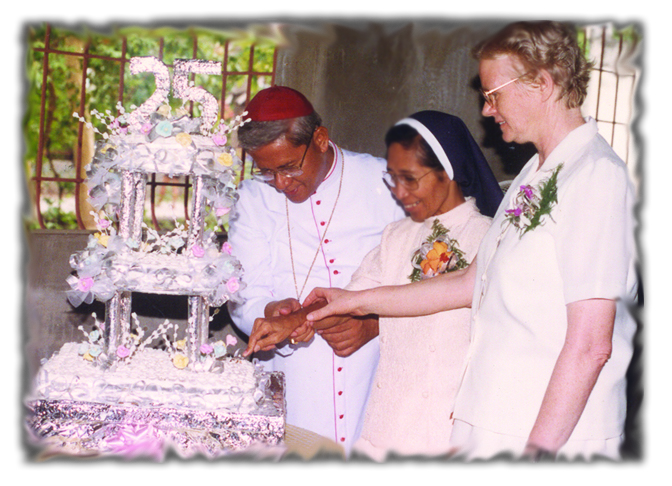
Sr Fidelis celebrating her Silver Jubilee
So one day, she went to the market to see for herself certain possibilities. She saw some vendors selling fish in small quantities by the roadside. There were still vacant spots. So, she approached the pharmacy owner, and explained her plans. He remarked, ‘Aren’t you ashamed to be a fish vendor when you have a decent job here in the pharmacy?’ My sister’s response was, ‘I have nothing to be ashamed of. Labor is honorable.’ The owner consented and told her she could return to the pharmacy if her little fish business failed. And so she went.
She rose very early the next morning, and headed for Aguisan Fish Center, about seven kilometers away, and purchased two medium-size baskets of fish. She rushed to our town market, took her position at the roadside, and sold all the fish by 11:30am. She counted her cash, and was excited to find that the fish had gained her a profit of P5 that very day! So, if that were multiplied by 30, it would mean P150 Pesos per month. Not bad for a beginner.
Later on, the fish business expanded a bit and she financed her schooling with her earnings. Finally, after much hard work and struggle, she finished her BSC course in 1965 and consequently edified her younger sister and brothers with the challenging lesson that ‘sacrifice can lead one on the road to success’.
Answering a higher call
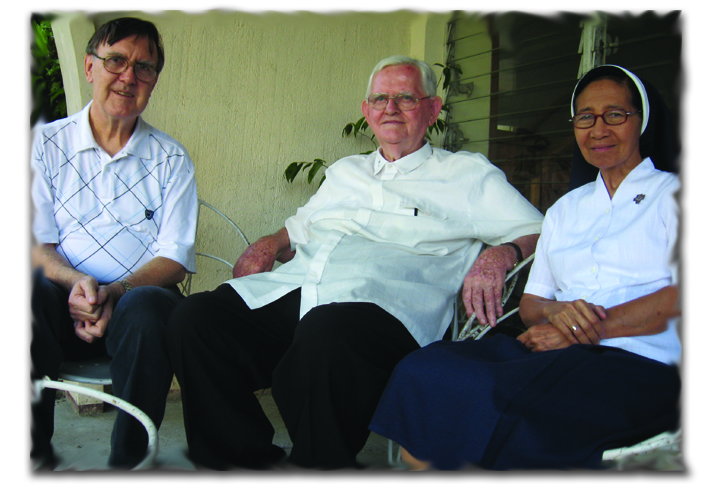
Our Editor with Fr Hurley and Sr Fidelis
With her graduation, a new horizon opened to her. She taught for two years at Our Lady of Snows High School in Himamaylan. Her close association with the Presentation Sisters as well as the Columban Fathers probably reinforced the call of the Lord to the religious life.
And so, after this teaching stint, she left for the novitiate of the Presentation Sisters (PBVM) in New Zealand. When she made her First Profession in April 1970 she became the first Filipino Presentation Sister. She chose ‘Fidelis’ as her religious name, to indicate her fidelity to the call of the Lord. With God’s superabundant grace, she was accepted for Perpetual Profession in April 1975.
Fish was very special to our Lord Jesus Christ. Moreover, it became a powerful symbol of the Lord Himself in the early Church during the persecution. Fish was the source of livelihood for Peter and many apostles before they answered the call of the Lord. Fish, ‘ichthys’, gave Sister Fidelis T. Sabio PBVM a way to the Lord.
You may write Sister Fidelis at: Presentation Sisters, Scala Retreat House, PO Box 95,
6100 BACOLOD CITY
You may email Father Ray at haeyangrts@yahoo.com
A Renewed Community Of Prayer
By Rowena Dato Cuanico
Rowena ‘Weng’ Cuanico, from Northern Samar, has completed six years as a Columban lay missionary in Fiji and is renewing her commitment for another three years. She tells how a prayer group there comes back to life, thanks to moments of inspiration and a lot of hard work.
As a Columban lay missionary in Fiji, I worked for some time with the Indo-Fijian community in St Pius X Parish in Raiwaqa. I had spent two wonderful years in Holy Family Parish in Labasa working mostly with Hindi-speaking communities, so I was excited once again to accompany Hindi-speaking Catholics in Raiwaqa.

Fiji Archbishop Petero Mataca marked Doreen Lal with the sign of the cross during her rite of entry to the catechumenate
during her baptism ceremony
I came to the parish with a list of about twenty Hindi-speaking families in the parish. With such a group, it would seem that starting a mandali (prayer group) should come easily – even if the group had been inactive for six years – but it wasn’t to be.
Daunting task
We had two meetings that gave people the opportunity to get to know each other. Although they expressed the need for a mandali as a support group, it seemed to me they were reluctant to start one. I was getting impatient. Maybe I was looking for some results, and these weren’t happening. But I didn’t feel discouraged, thanks be to God. I just kept on visiting and visiting them.
Finally, a breakthrough came. Some members shared with me that they didn’t have any experience with a mandali. As much as they would like to start one, most didn’t know how to go about it. There was no prayer group in the parish when some of them were baptized. I admired their courage and honesty in sharing this with me. We had to start from the beginning and the task seemed daunting.
I shared the situation with Columban Father Gerry McNicholas, our parish priest. His words were clear: ‘Maybe we won’t be able to start a mandali, but hopefully we will be able to provide a link to the future.’ And so began the task of introducing the families to prayers and hymns in the Hindi language.
Modest beginnings
It must have been providential that in January 2005 Columban Father Pat McCaffrey assumed his responsibilities as coordinator of the apostolate for Hindi-speaking Catholics in Suva. With his mastery of both the Hindi and Fijian languages and his work in Labasa as a young priest, Father Pat has been creating a stir by giving life and support to the community. The initial activity was a gathering of all Hindi-speaking Catholics from seven parishes, including ours, at St Joseph’s Secondary School.
Some lay leaders, Father Pat and I spent about three days visiting fifteen families. It was tough work. In February, eight families from the parish came to the meeting, some seeing each other for the first time. For me, it was a sign of life and hope.
During our discussions, the families again expressed the need for a mandali in the parish to help them grow in their faith. They decided to meet each Sunday after 7am Mass to organize the mandali until it was up and running.
The occasion of blessing the home of Daniel and Kalawati Kumarsami proved to be the perfect occasion for the first mandali. It rained heavily on the days preceding and I knew the place would be very wet. Kalawati was certain the mandali would go on and that their place would be dry. It wasn’t dry at all, but Kalawati wouldn’t take no for an answer. The weather couldn’t stop us from having the mandali. Kalawati must have looked forward very eagerly and prayed hard for this moment.
Long-Awaited Mandali
On that Saturday night, the mandali of St Pius X Parish came to life again. It was a moment of great rejoicing and thanksgiving as parish families, with Hindu friends and neighbors belonging to other Christian denominations, gathered for a prayer group for the first time in six years.
The baptism of a catechumen, Doreen Lal, also proved to be a rallying point for the community. She was undergoing the ten-month Rite of Christian Initiation for Adults (RCIA) when I came to know her and her husband, Ravin. To be part of the preparations for her baptism proved meaningful for me.
When God leads
On the Saturday before Palm Sunday, we had the mandali at Doreen and Ravin’s house. Doreen shared that she had never imagined that she would become a Catholic. But, she said, this is where God had led her. She was thankful for the openness of her family and the support of her husband.
She made a very special request: she wanted us to sit next to her during the Easter Vigil. She said it would give her courage and strength to see us when she turned around.
Before we finished the mandali, we gathered around Doreen. Father Pat led us into a prayer, asking the Holy Spirit to continue to guide Doreen and to give her faith, courage and strength.
During the Easter Vigil, when she stood up at the beginning of the rite of baptism, Doreen was given an aarti, an Indian way of expressing our welcome for her. She would later share with me how that seemingly simple ritual stirred a lot of feelings within her. She felt welcomed because the aarti was a ritual close to her heart as an Indo-Fijian.
The parish organized a welcome reception for her in the hall. Both Doreen and Ravin spoke eloquently of their love story – a young Catholic man, himself a convert, marrying a Hindu. It was almost too good to be true, almost a fairy tale of romance, love and religion. It was a proud moment for the parish, particularly for the Hindi-speaking community.
Our community is still very young. We still have to reach out to other Hindi-speaking families. We need to bond, pray and work more with each other. Sadly, Doreen and Ravin have moved to another parish.
Growing confidence
But if we look back at how we started we have every reason to be happy and grateful to each other, the parish leadership, the different sectors and to God. The mandali members are becoming more confident, and it seems they have started to feel proud of being Indo-Fijian Catholics. This was very evident in the excitement and pride the members felt when we were given the task of doing the aarti during the welcoming ceremony for an international gathering of Columbans held in Fiji in April 2005.
There is again excitement in the community. We are again accompanying families on their journey of faith. We planned to start the RCIA in our parish, with some members of the community who’d gone through the program as facilitators, sharing what they’d received. This pushed through successfully in my last year, but that’s a story for another day.
Our work is not yet finished. We have just begun.
You may email the author at rowenacuanico@gmail.com
A Waiting Missionary
By Fr Ariel Tampus SVD
In the January-February 2006 issue Father Ariel described his experiences as a seminarian during his two-year Overseas Training Program in Zimbabwe, where he was hoping to return. Having been denied a visa for there, he applied for one to Botswana and, a ‘waiting missionary’ no more, left for there in January.www.svdbotswana.com is the website for the Botswana – Zambia – Zimbabwe province of the Missionaries of the Divine Word, known officially in Latin as Societas Verbi Divini, hence ‘the SVDs’ as their popular name in the Philippines.
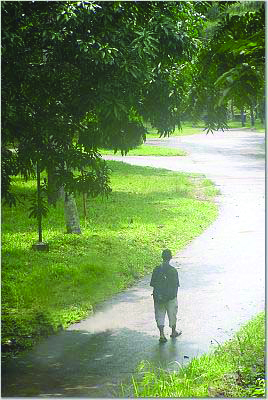
PHOTO: Francis Espera
I am a ‘waiting missionary.’ I call myself by this new term because I’m a missionary of the Society of the Divine Word (SVD) waiting for over a year now to go to my mission in Africa. The main reason why I am still in waiting is the political crisis in Zimbabwe, where I’m assigned. At the moment, this country is being sanctioned by the international community due to the many injustices by the government against its people. My brothers working there informed me that the Zimbabwean government is very cautious about granting entry visas for missionaries, since the local Catholic Church is very vocal in criticizing the government. And that makes me a waiting missionary. At present, I’m still in the Philippines.
Like St Paul’s Missionary Journeys
One brother told me once that I shouldn’t lose hope, that I shouldn’t be tired of waiting for that is what our Christian life is all about. Christians are always in waiting for the reign of God. What a consolation to hear this from a co-missionary! So I started to accept that this is part of God’s greater plan for me. To participate in God’s plan, I started to make my waiting time more productive. I envisioned a plan to make my future missionary experiences in Africa more alive because of my experiences here in the Philippines. I proposed to my superiors that I be allowed to visit and experience our many frontier missions here in my own country. They were more than happy to grant my request for my growth as a Divine Word Missionary. I can compare my experiences with the many missionary journeys of St Paul. He covered so many missions in his lifetime. I managed only three.
First Stop:
Quinlogan Mission in Palawan
Quinlogan mission is a new frontier mission of the SVD Philippine Central Province. It is located in Palawan, around 180 kms from Puerto Princesa City, the island-province’s capital. My first impression of the place was that it was still very undeveloped. It made me realize that there are still many places in my country without electricity, something I can hardly imagine in our modern and highly technological world.
The people are very poor since most of them depend only on fishing. Many times during my stay there we ate only sardines since the fishermen sometimes didn’t have a catch because of typhoons. People in the area learn to live one day at a time. There were no refrigerators, so we had to go around everyday to look for our ‘daily bread’.
During my one-month stay there Fr Antonio Enerio SVD, the parish priest, made a point of letting me experience everything that makes a Quinlogan missionary – how to drive on a rough road, what to do when the mission car breaks down, when the resources aren’t enough for survival, and why we are doing all this. It was indeed a very memorable experience to live my vow of poverty among the poor. Poor missionaries among the poor – that describes the SVDs in our Palawan mission.
Second Stop:
Aguinaldo Mission in Ifugao
This frontier mission is under the responsibility of the SVD Philippine Northern Province and is managed by Fr Teody Saluba SVD. When people talk about the Ifugao, they usually think of the beautiful Banaue Rice Terraces, one of the ‘Wonders of the World’. Indeed, the place is full of wonders, including our missionaries there. Since the area is very mountainous, many Christian communities can’t be reached by car. So our missionaries there don’t have much choice but to walk and climb for an hour or two to reach them.
My two weeks in Aguinaldo let me experience this wonderful reality. Indeed, it took tons of patient love for mission. As I was catching my breath when we reached the mountaintop to celebrate the Eucharist with the people there, I reflected that it seemed to be the favorite ‘pastime’ of our Lord to climb a hill to pray. I have no doubt our men working in this area are God’s favorite missionaries, for they have the same favorite ‘pastime.’
Third Stop:
Ipil Mission in Zamboanga
My third missionary journey brought me to our newest mission in the Southern Province of SVD Philippines. Getting to the mission was already hard work. From Zamboanga City it took me almost a day to reach the mission station. Travel time could be cut by half but for the rough roads and lack of buses. Our bus left early in the morning for Olutanga Island, the whole of which has been given by the Prelature of Ipil to the SVDs for pastoral care. It has two parishes and a quasi-parish and I stayed in Mabuhay mission with Fr Joseph Audiencia SVD and Fr Jerry Perocho SVD.
What is very interesting about Olutanga is that it is our only mission in the Philippines where we live side-by-side with our Muslim brothers and sisters. Since the area is a Muslim settlement, our Christian communities have many opportunities for inter-faith dialogue. I realized there that we can always co-exist with our Muslim brothers and sisters. After more than a year of SVD presence in the island, I can see that there is a lot of mutual respect and our confreres are planning activities to strengthen this.
The Journey Continues
My three missionary journeys made me realize that in our pilgrimage towards God’s Kingdom we can always do something worthwhile on the way. Whatever form this may take, it should make us realize that we are all companions on this one journey. Whether in Palawan, Ifugao or Zamboanga, or maybe in Zimbabwe, our journey continues.
But the fact is, we sometimes have to wait!
You may contact the author at ayheesvd@yahoo.com
Adoration And Contemplation: Priority In Mission
By ‘A Hidden Pearl’
Here we publish the last of a three-part reflection by a ‘Pink Sister,’ now 82, who prefers to be known to our readers as ‘A Hidden Pearl.’ The official name of the congregation is ‘Sister Servants of the Holy Spirit of Perpetual Adoration’, www.adorationsisters.org . The Sisters have six monasteries in the Philippines.
Jesus chose to live the hidden, humble Nazareth life for 30 long years – years of an uneventful succession of prayer, work, silence and solitude in the company of Mary and Joseph. This was a phase in Jesus’ mystery of which Scripture speaks in a few terse words: ‘and He was subject to them...He grew in wisdom and grace!’ We have been called to the same simple, humble and hidden life – not for just 30 years but for life!
A mystery of our vocation for which we find no exhaustive answer! Why me? Why you? God alone has the answer! He chose you and me, and none other. For our giftedness or worthiness? NO! A resounding NO indeed – simply because He wills, out of pure gratuitous love for each one of us! The reason for our call is hidden in Christ our Lord – to be His chosen one, his beloved, to live the Nazareth life, in humility and poverty, in simplicity, in service of God and neighbor hidden from the world, but known to GOD ALONE!
A mystery of ordinariness – most of us have left behind a glorious career, social position, a colorful, perhaps successful, status. God called, we responded – we left everything – loved ones, passions, contracts – ALL! To live the ordinary Nazareth life – without glamour, without the limelight and ovation of the world. Why? It’s the mystery of ordinariness that we are called to live and to share with one another and with others. Sink deeply into it – love it, revel in it because there is NO DANGER of false illusion, of deceptive success. Ordinariness removes all vain glory and self-seeking. Living with the mystery of ordinariness identifies us more intimately with the three holiest persons on earth – Jesus, Mary, and Joseph! To live the ordinary extraordinarily well is to live fully its mystery.
A mystery of faith – why indeed did Jesus live 30 years in Nazareth – unknown, hidden from the rich and powerful? We need not ask the reason – our assent of faith to this mystery suffices. To be hidden in God, to live in Him, with Him and through Him – to the glory of the Father – this is the vocation of Jesus and our own, and we have been chosen to live it in the cloister, in our humble duties, our faith-filled lives, our hiddenness in the bosom of the Triune God. What an awesome mystery! Faith alone enables us to immerse deeply in it and be gripped by it – rejoicing to be unknown, forgotten, despised like Jesus. Total identification with Him becomes our joy, our fulfillment.
As missionaries, let adoration and contemplation be a PRIORITY for all of us – NOT a luxury. Let us look always at the Face of Christ – focus our gaze on Him especially on the ‘little ones’ and be radiant witnesses of His love – mercy – compassion whether we are; we shall truly be ‘epiphanies’ of Christ – living monstrances – ‘other Eucharists’ because we follow His commandment of love: ‘Love one another as I have loved you!’
You may write the author as follows:
‘A Hidden Pearl,’ St Joseph’s Convent of Perpetual Adoration,
AC PO Box 388, 3001 QUEZON CITY
Attacked In Botswana
By Father Patricio de los Reyes SVD
Father de los Reyes, from Cebu, is SVD Provincial in Botswana-Zambia-Zimbabwe and had an article here in March-April last year. Here he describes a horrific life-threatening attack that occurred before we published it. We were able to report at the time that he was recovering well. But such an experience leaves scars, particularly emotional ones.
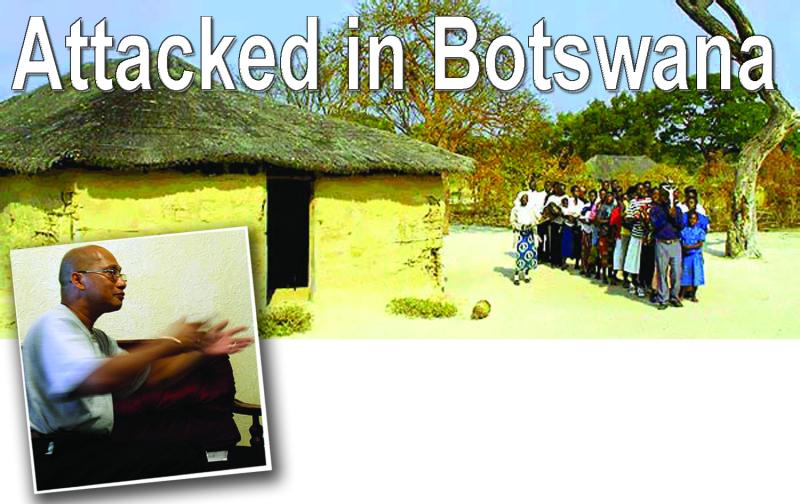
It’s been difficult to write about what happened to me the night of 18 November 2005 at the SVD house in Francistown, Botswana. Recalling it when it was still fresh made me utterly depressed, though I tried to tell people the significant elements of the story. I know in my heart that telling it will help me heal. I realize also that unburdening myself isn’t easy. Writing in detail gives me the feeling that I’m dying. It makes me groggy and I can’t stop crying. But I think I must tell the story, at least, for my own sake.
It was 10:45pm and I’d just finished watching the movie Troy. I said goodnight to everybody and headed for my room but then realized that the gate to the compound was still wide open. So, I opened the front door and walked toward the gate to close it. It was dark and warm outside. My pet dog, Tootsy, was barking, which I took for granted although I said to her, ‘What are you barking at?’ while looking in the direction she was facing. I saw two African faces, one partly hidden in the darkness, the other face clear. Without warning, I felt a blow on my head, as sudden as lightning. The thud sounded like that of an iron tube. I felt weak and fell to the ground. These people were trying to hurt and even kill me! As I fell, I called out, ‘Lord, help me.’
Miraculous escape
I didn’t lose consciousness and saw the lower body of the one hitting me. I thought I could defend myself by kicking his crotch. I raised my leg, putting my weight on my left arm only to realize that it was injured. I fell back. The man continued hitting me on the head. I remained conscious, but still can’t understand how I managed to get up and run back to the house. As I ran, I shouted to my companion, ‘Paul, they’re killing me.’ Father Paul Siju is a young Indian SVD who studied in the Philippines as a priest. I was aware that I closed the door and tried to lock it, but my right hand seemed weak. Later on, in the hospital, I discovered that my forefinger had been almost severed from my hand.
I became aware of Paul embracing me to make me steady and helping me sit on the floor. I told him I was cold and he wrapped me in blankets while I asked him if he was all right. He said he was and that I was injured. Then I became totally aware of what happened to me. Paul said he’d already called up other SVDs and that our other companion, Brother Charles Ashun, a Ghanaian, who was outside at the time, was already coming and they were going to bring me to the hospital. I felt I was becoming weaker but tried to breathe more air. I knew I wasn’t dying for God had helped me. I felt drowsy but Paul shook me gently and told me not to sleep.
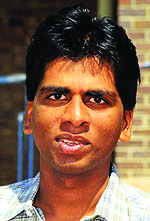
Father Paul Siju
I learned later that we reached the hospital within ten minutes and that the medical personnel helped me immediately. I became aware of people doing something with my head. I said I was thirsty. Somebody told me I shouldn’t drink water. So I asked, ‘How about beer?’ I heard them laugh. ‘Good’, I said to myself, ‘people shouldn’t panic.’ I knew everything would be fine.
At the edge
I felt so cold and there was only darkness. Everything stopped as though I had totally ceased to exist. Both my conscious and sub-conscious minds were quiet. Not even a dream.
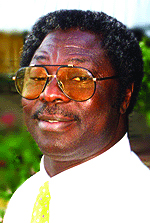
Brother Charles Ashun
Then there was the warm feeling of security, of being loved. I was enveloped in peace, as if a white light was encapsulating me, protecting me. There were no shadows. It was a life-giving solitude. But I wasn’t alone. Someone was watching over me, embracing me lovingly as it were, as if I was again in my mother’s womb, warm, safe and cared for, with no memories bothering my mind. I was totally gone from this world.
I had seven fractures in my skull. As I was being brought to the hospital, my brain fluids were already starting to ooze through the seven leaks created by the weapon the man had hit me with. ‘Lucky’ seven! I also had five blood clots in my brain. They’re all gone now, dissolved, except for the haunting memory. My left arm was badly injured, the elbow 85 percent broken and the two bones in the lower arm separated from those in the upper arm. My orthopedic surgeon was a miracle maker. He put everything back together. May God bless his hands.
I woke up, my eyes still heavy and went back to sleep. I heard people calling my name. But I was still tired and weak. I couldn’t talk because of the tubes inserted into my mouth and nose. I moved my left hand to tell them, ‘I’m here’. I heard someone say, ‘He’s with us now’. I thought, ‘I must have been gone for quite some time’. I slept again. I was ‘lost to the world’ for four days.
I woke up again, opening my eyes weakly. Someone spoke. Someone else uttered a prayer and words of concern and consolation. Everybody was praying for my speedy recovery. ‘I must have been injured badly’, I thought. ‘Yes, I remember that someone wanted to kill me. But I wasn’t dead. I’ve survived. The Lord heard my call and helped me survive’. I thought of the man, still not apprehended. I could see his face clearly in my mind. I thought, ‘I won’t let what happened to me pull me down. I’ll get up and live my life again’.
Forgiveness?
Angry? No. But I felt some guilt, though. Resentful too that I hadn’t paid attention to Tootsy barking fiercely, warning me that something was wrong. But I didn’t listen. Too late - but not too late to live again.
I thought often of the man as a lay quietly on my hospital bed. Even today, his face is still fresh in my memory. I thought I must forgive him in order to be healed and to stay alive. In spite of forgiving him, in spite of the help I obtained to turn this negative event into a positive and beneficial experience, my heart still bleeds and I can’t help but cry every time I remember it. I continue to forgive the man from my heart, not for his sake but for my own.
It’s unfair. There seems to be no justice one can reach in this kind of crime. Every time I see the scars on my head I’m reminded of how unfair things can be; but I must forgive. Because of the injury to my left brain, my right arm and hand stay limp at times. I think of how unjust in things can be in this world. I want justice because my heart has been scarred deeply; but I must forgive. I have become suspicious of any African male and every African male becomes the culprit; but I must forgive. I have lost my trust in any African man because one of them betrayed my trust, but I must be realistic and I need to forgive. I must forgive my attacker, not for his sake but for mine.
I’m not yet healed completely, but I thank God I’m alive. People say that God willed it. I mean, that I should still be alive. Maybe God willed it too that I should get hurt, but I’m not so sure. I don’t know if God has given me another life because of another plan for me. And if God has, I don’t have a clue what it is and what it will be. But I’m deeply grateful to God for the new life. What I’m very sure of at the moment is that God wants me to live my life fully with a pure intention and to give this life to serve others. How? I’m not clear yet. I believe God will make it clear to me in time.
Living a second life
Another thing I’m sure of is that God allowed me to stand at death’s door so that I may not fear death anymore, for whatever God wants me to do may require me to face death several times. My new life was given as a gift and I’m sure God wants me to offer it for something that will be life-giving too. I know, however, and feel deeply that God wants me to do more to make my life more significant – FOR GOD’S SAKE.
I still continue to discern God’s will for me this time. Please, help me pray that I may discern well and understand the significance of all that has happened.
You may write Father de los Reyes at: SVD Provincial House, PO Box 209, FRANCISTOWN BOTSWANA
The general email address there is svd.bots@info.bw
FROM THE HOMILY OF POPE JOHN PAUL II AT THE BEATIFICATION OF BLESSED PEDRO
AND 43 OTHER MARTYRS ON 5 MARCH 2000
‘If anyone declares himself for me in the presence of men, I will declare myself for him in the presence of my Father in heaven’ (Mt 10: 32). From his childhood, Pedro Calungsod declared himself unwaveringly for Christ and responded generously to his call. Young people today can draw encouragement and strength from the example of Pedro, whose love of Jesus inspired him to devote his teenage years to teaching the faith as a lay catechist. Leaving family and friends behind, Pedro willingly accepted the challenge put to him by Fr Diego de San Vitores to join him on the mission to the Chamorros. In a spirit of faith, marked by strong Eucharistic and Marian devotion, Pedro undertook the demanding work asked of him and bravely faced the many obstacles and difficulties he met. In the face of imminent danger, Pedro would not forsake Father Diego, but as a ‘good soldier of Christ’ preferred to die at the missionary’s side. Today Blessed Pedro Calungsod intercedes for the young, in particular those of his native Philippines, and he challenges them. Young friends, do not hesitate to follow the example of Pedro, who ‘pleased God and was loved by him’ (Wis 4: 10) and who, having come to perfection in so short a time, lived a full life (cf. ibid, v. 13).
Father Joeker

BOSSing around
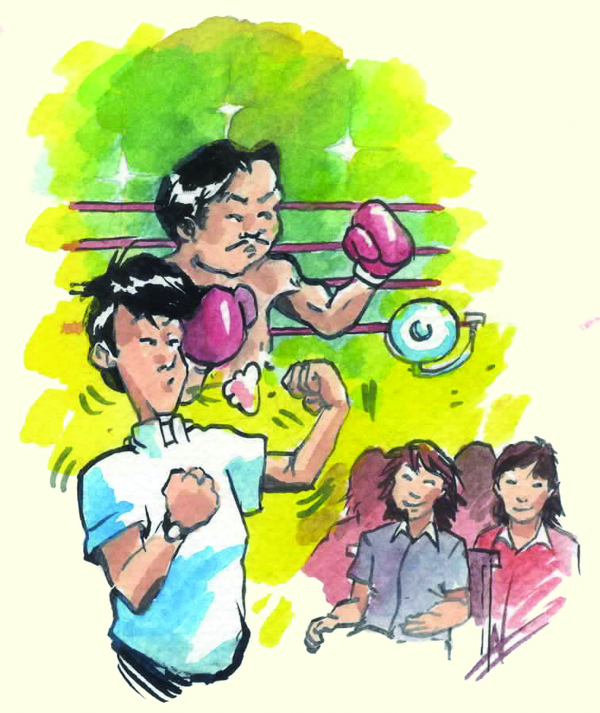
One talk in the Nemi Renewal Course was on how to express anger. I shared with the group that in Japan, there’s a replica of the Boss in the basement of a particular factory. Workers who dislike or get annoyed with the Boss can go down and ‘pulverize’ his replica with kicks and Manny Pacquiao-like punches. After that they feel better and go back to work again. Coming to the point I said, ‘Imagine you’re a tennis player and see the ball as the head of someone whom you simply don’t get along with, you’ll certainly hit it like a mad man . . . Everybody will befriend you’.
Quick associations
Madam Esther Rhule, Directress of Our Lady of Fatima Vocational and Business School, had two visitors from her hometown, Paul and Alice. After few days in Wenchi, I happened to be going down to Accra and Madam requested if the visitors could join me. Before we finally left, one of the bystanders asked Madam, ‘Where are they going?’ In my usual quick manner, I answered, ‘Paul is going back to Tarsus, Alice and I to Wonderland.’
Joeker’s Time
At Kuala Lumpur Airport in Malaysia, on my last home leave, I was sitting with a group of Filipinos. One of them called his friends in the Philippines by cellphone to remind them that our arrival was at 7pm, not 9pm as he had mistakenly informed them. ‘Ako rin’, said the other, ‘I told them 10pm’. Whereupon I joined, ‘Good for you, your mistake is by hours, mine – by a day. The date I gave them was yesterday’s, not today’s’.
Of Course?

While in Ghana I received a questionnaire from Fr Ittoop concerning the Renewal Course in Nemi, Rome. One of the items was, ‘State your personal reasons why you want to join the course.’ I wrote, ‘For the same reason that you are running the course.’ Another question was on mental and physical health where I answered, ‘By the way, I’m coming with my tennis racquet.’ True enough I was among the chosen few.
Mission In The Mall
By Father Dan Joe O’Mahony OFMCap
Deep-sea fishing is very hard work! It’s also a good image of what I’m doing at the moment. It’s very different from the time I was chaplain in various community schools where life was very structured and I had great support. But, we work under the gentle prompting of the Holy Spirit; each day praying, ‘Oh, that today you would listen to the voice of the Lord...Listen...Today...Listen to the Spirit.’ And this has led me to my present position: I am an industrial chaplain, working in a town center or shopping mall.
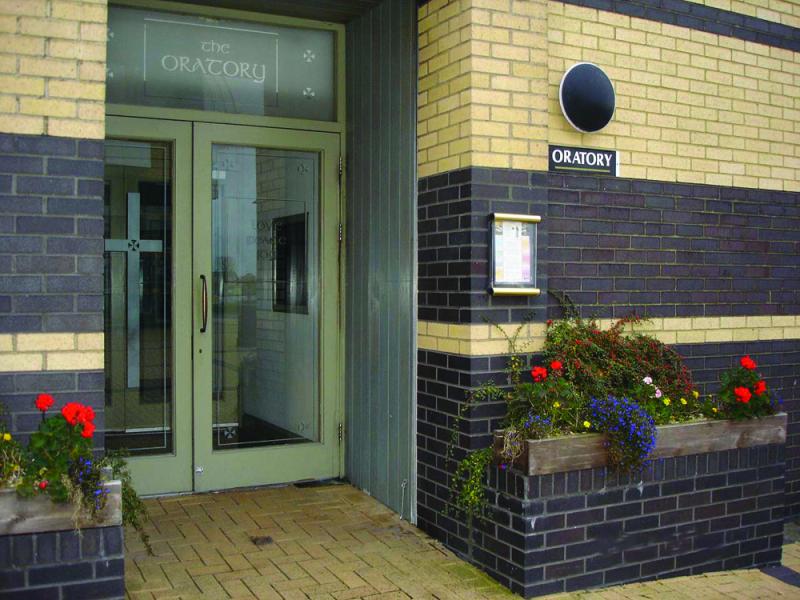
The Oratory, beside the Yellow Entrance to The Blanchardstown Centre in West Dublin, Ireland, is my base of operation. It seats 70. In the Centre itself, we have 4,000 staff working in 156 outlets and we had 14 million shoppers last year. We in The Oratory are tenants. We are part of a collaborative effort between the Archdiocese of Dublin and the Capuchin Friars.

Let me say I am happy to work here in this oasis of welcome, friendship, silence, peace and prayer – a witness to God in the marketplace. Hopefully, we are flexible, user-friendly and especially want to show the compassionate face of Christ to the 200 or more people who visit The Oratory each day. This demands that we live the incarnation each day – dealing with the messiness of life, with its joy, pain, hurt, confusion, anger, reconciliation and peace.
I know why St Paul said, ‘We apostles are at the end of the parade, the scum of the earth, the off-scouring of the universe,’ in his first letter to the Christians in Corinth. We’re laughed at by the practical ones of this world. They ask: What have you to show for your work? We’re fishing around, we answer. We’re enticing hearts and calling them into love. Our catch is hard to measure and the product is never completed by closing time.
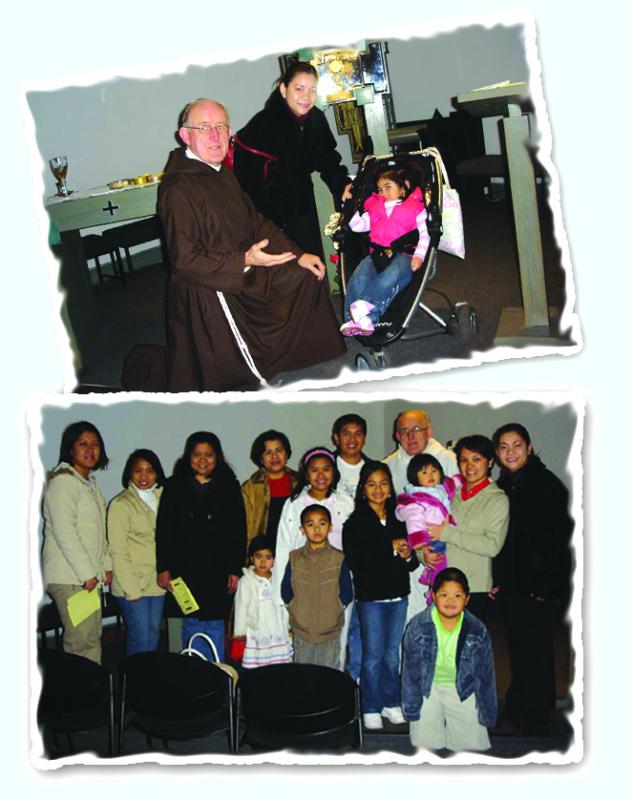
In a sense, The Oratory is like a hermitage, as we spend about 70 hours a week waiting or gazing on the Lord – a God of surprises who helps us be creative in our prayer and liturgies. St Aidan got it right when he said, ‘Meet people where they are.’ He realized that the Spirit of God works from below up, prompting and urging us to risk at times and to speak the truth in love.
We are blessed in many ways here in The Oratory: with the good will of the manager, our volunteers who staff the office and phone, the people who give alms and food which ties in with the life of a mendicant friar, which is what I am. The Blanchardstown Centre is a focal point for 100,000 people, many of whom are anonymous – people who work in IBM, 3Com or Mailinckrodt, developing a Silicon Valley here in Dublin 15. And we are still growing; we have about a dozen builders’ cranes working in various parts of The Centre at the moment.
http://bcoratory.irishcapuchins.com/chaplain.html
Our Hideaway

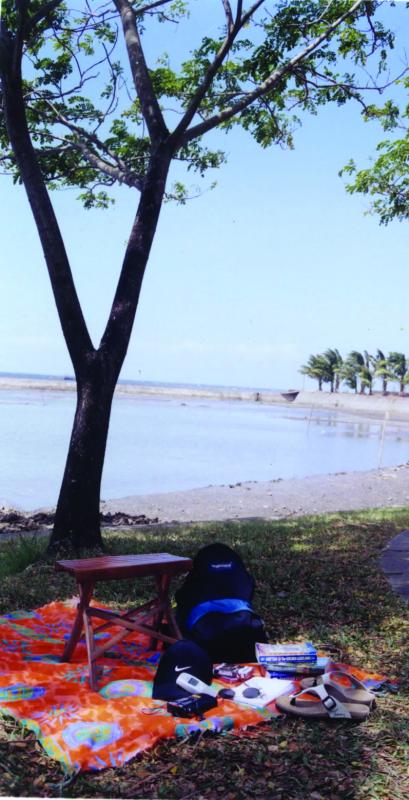
A venue for the youth to express themselves and to share with our readers their mind, their heart and their soul. We are inviting you – students and young professionals – to drop by Our Hideaway and let us know how you are doing.
My Social Responsibilities
By Dennis Rolan Labandia
Dennis Rolan Labandia is a freshman at Xavier University, Cagayan de Oro. Here he shares his experience of serving his community through the NSTP (National Service Training Program).
In conformity with government regulations, Xavier University requires all freshmen to register for two semesters of NSTP during the regular enrollment period. This is a way of involving them in a commitment to be men and women for others. In this sense, I feel my social responsibilities pertaining to an active social involvement in community work. This education promotes faith that is committed to the work of justice, preparing each one for an active life commitment as a person for others. It is geared to making the new generations become true catalysts of social change.
Life changing encounter
The people and schoolchildren in the community to which we were assigned welcomed us with all their hearts on our first visit. We greatly appreciated this. I feel the heartwarming experience of integrating and interacting with the adults and children who are willing to learn as we gather every Saturday for this program. This process of integrating with and empowering them is part of helping them become better persons and responsible citizens of the country. I do this by nurturing them, imparting to them what I have learned.
The hallmark of developing the community, especially the schoolchildren, towards the right path and enlightenment is heartwarming care. This care is greatly determined by the extent of our personal conduct and by our words and deeds. I see it as the manifestation of faith in and love of God and as a growing awareness of my responsibilities as a member of society and a citizen of our country. We work hand in hand with our assigned community in promoting and sharing the spirit of peace and unity.
Lessons learned
For me the experience has great value because it calls for the equal treatment of each human being and a respect for the uniqueness of each individual. It facilitates a greater understanding of our role as citizens in society leading to an appreciation of the future to be developed in the community. At the same time, the children in the community gain knowledge from us but also learn to distinguish their own ideas from those of their tutors.
This government program for all freshmen is a symbol of hope, as it plays an important role in molding the youth regarding our responsibilities as members of the community and citizens of the Philippines: the most sublime of human aspirations.
You may email the author at knights_7789@yahoo.com.ph
Send us your story (500 to 1,000 words) to PO Box 588, 6100 Bacolod City
or email it to us at editor@misyononline.com Don’t forget your picture. It makes the difference.
Peace by Peace

‘Do not be afraid that your life will have an end; be much more afraid that it will never have a beginning’
–The Venerable John Henry Cardinal Newman (1801 – 1890)
***
EDSA PRAYER FOR PEACE
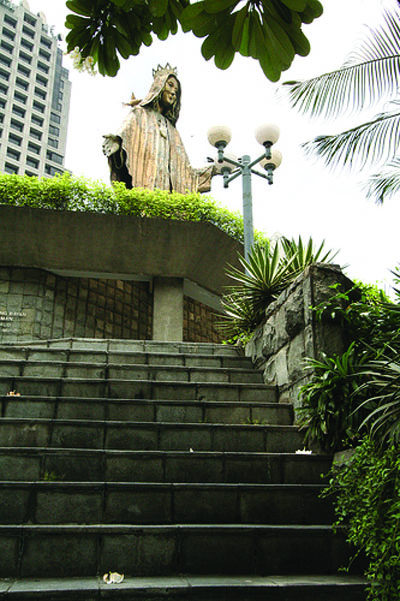
Lord Jesus, we come to you in our need. Create in us an awareness of the massive forces of conflict that threaten our world today. And grant us a sense of urgency to activate the forces of goodness, of justice, of love and of peace.
Where there is armed conflict, let us stretch out our arms to our brothers and sisters. Where there is abundance, let there be simple lifestyle and sharing. Where there is poverty, let there be dignified living and constant striving for just structures. Where there is selfish ambition, let there be humble service. Where there is injustice, let there be atonement. Where there is despair, let there be hope in the Good News. Where there are wounds of division, let there be unity and wholeness.
Help us to be committed to the building of your kingdom, not seeking to be cared for but to care; not expecting to be served but to place ourselves in the service of others; not aspiring to be materially secure but to place our security in your love.
Teach us your spirit, for it is only in loving imitation of you, Lord, that we can discover the healing springs of life that will bring about new birth to the earth and hope for the world. Amen.
Our Lady, Queen of Peace. Pray for us.
Courtesy of Our Lady of Peace
Shrine, EDSA
(From www.cfcglobal.org.ph/home.htm)
***
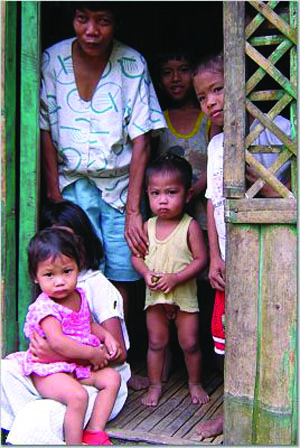
It Begins at Home
Mother Teresa of Calcutta
‘The world is upside down because there is so very little love in the home. We have no time for our children; we have no time for each other; and there is no time to enjoy each other. That is why there is so much suffering and so much unhappiness in the world today. Everybody seems to be in such a terrible rush, anxious for what is bigger and better and greater, and mothers and fathers often do not have time for each other, let alone their children. In the home begins the disruption of the peace of the world.’
***
Pope Benedict to the Bishops
of Switzerland, 9 November 2006
‘I often hear it said that people today feel nostalgia for God, spirituality and religion, and that they begin to see the Church as a possible interlocutor from which something may be received in this regard . . . However, what people find very difficult are the ethics the Church proclaims. I have long reflected upon this matter, and I see ever more clearly how, in our time, it is as if ethics have divided into two parts. Modern society is not simply ethic-less but has, so to say, “discovered” and claimed another aspect of ethics which, in the Church’s announcement over recent decades . . . has not been sufficiently emphasized. This includes the great themes of peace, non-violence, justice for all, care for the poor and respect for creation.’
***
Oldest Great War (1914-18) Veterans Meet
Henry Allingham was born in England on 6 June 1896 and Robert Meier on 10 March 1897. They fought on opposing sides in the First World War but met for the first time on 29 October last year when they laid a wreath at the Great War memorial in Witten, Germany. These two men, each the oldest person in their respective countries, greeted each other as long-lost brothers. One British reporter noted, ‘For long minutes their hands remained as if welded together’.
More than 65,000,000 soldiers were mobilized in ‘The War to End all Wars’, as the Great War / First World War was described. Conservative estimates put the death toll of soldiers at around 7,300,000 and the number of wounded at more than 27,000,000. Actual figures may be much higher. The vast majority of these were young men in their teens and early 20s. It was also the last major war where civilian casualties were in a minority, though countless ordinary people were displaced.
You can find more details and a photo of the two men laying
a wreath together at http://news.bbc.co.uk/1/hi/uk/6100524.stm
***
The society which scorns excellence in plumbing because plumbing is a humble activity, and tolerates shoddiness in philosophy because philosophy is an exalted activity, will have neither good plumbing nor good philosophy. Neither its pipes nor its theories will hold water.’
–John W. Gardner, US Secretary of Health Education and Welfare 1965-68
***
Points of Light

By Thomas Merton
In the old days, on Easter night, the Russian peasants used to carry the blest fire home from church. The light would scatter and travel in all directions through the darkness, and the desolation of the night would be pierced and dispelled as lamps came on in the windows of the farm houses, one by one. Even so the glory of God sleeps everywhere, ready to blaze out unexpectedly in created things. Even so His peace and His order lie hidden in the world, even the world of today, ready to re-establish themselves in His way, in His own good time: but never without the instrumentality of free options made by free men.
The weeks from Easter to Pentecost are weeks of tremendous Christian joy: the joy of knowing that the Lord is risen to everlasting life, and the incredible joy of sharing his resurrection through baptism.
Consider the immense joy of possessing the Eucharist, food from heaven; the joy of living with our minds lifted to the supernatural world; the deep realization that we have divine life and can live supernaturally; and the joy of being witnesses in this world to the Risen Christ.
Prayer To Blessed Pedro Calungsod
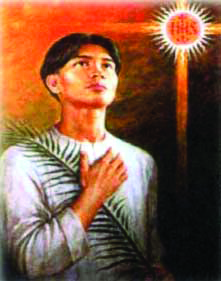
Blessed Pedro Calungsod,
student, catechist, young migrant,
missionary, faithful friend, martyr,
you inspire us by your fidelity
in times of adversity;
by your courage
in teaching the faith
in the midst of hostility;
and by your love
in shedding your blood
for the sake of the Gospel.
Make our troubles your own
(here mention your request)
and intercede for us before the throne
of Mercy and Grace
so that, as we experience
the help of heaven,
we may be encouraged to live
and proclaim the Gospel
here on earth.
Amen.
(With ecclesiastical approval)
pcalungsod.keldesigned.com
Serious About God?
Then get serious about confession
Lent is a time for repentance and the sacrament of reconciliation, which we usually call ‘confession’, is God’s particular gift to the Church where we can experience God’s forgiveness. This article appeared on 17 November in Catholic Sentinel, www.sentinel.org, where Bishop Vasa writes a weekly e-column. It has been slightly edited.
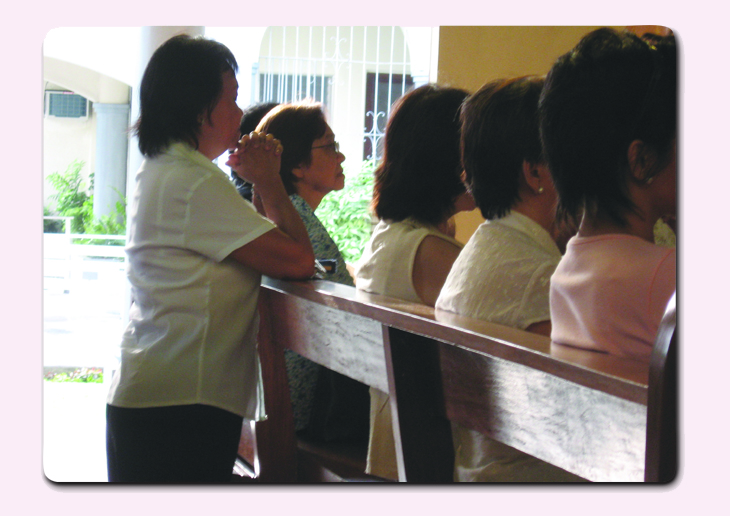
Choosing as I have to focus some additional energies on the Sacrament of Penance, I could not help but be struck and attracted by the L’Osservatore Romano headline of 18 October: ‘Time spent in the confessional reveals the merciful Face of the Father.’
L’Osservatore Romano is the official weekly newspaper of the Vatican. The headline refers to the remarks of Pope Benedict XVI to the Bishops’ Conference of Canada who were in Rome for their ad limina visit.
Parable
After offering a brief reflection on the Parable of the Prodigal Son the Holy Father writes: ‘Dear Brothers, as you reflect upon the three characters in this parable – the Father in his abundant mercy, the younger son in his joy at being forgiven and the elder brother in his tragic isolation – be confirmed in your desire to address the loss of a sense of sin, to which you have referred in your reports.’
The Holy Father continues: ‘From this perspective, the bishop’s responsibility to indicate the destructive presence of sin is readily understood as a service to hope: it strengthens believers to avoid evil and to embrace the perfection of love and the plenitude of Christian life. I wish, therefore, to commend your promotion of the Sacrament of Penance.
‘While the sacrament is often considered with indifference, what it effects is precisely the fullness of healing for which we long. A new-found appreciation of this sacrament will confirm that time spent in the confessional draws good from evil, restores life from death and reveals anew the merciful face of the Father.’
Goodness from evil
What a beautiful way to describe the ministry of the priest in the confessional: ‘Time spent in the confessional draws good from evil.’ Confession involves a genuine conversion in the heart of the penitent, but as the Holy Father indicates, it does even more than this; it literally draws a great good – conversion, an experience of healing, an experience of the Father’s mercy – out of that which was offensive to God.
We could almost cry out with the cantor at the Easter Vigil, ‘O Happy Fault, O necessary sin of Adam, which gained for us so great a Redeemer,’ so great a sacrament. What a privilege for the priest to have an essential part in this conveyance of the Father’s mercy. What a privilege to patiently await the opportunity to reveal the merciful Face of the Father.
Tragic loss
The Holy Father then addresses the loss of the sense of sin. He says: ‘Understanding the gift of reconciliation calls for a careful reflection on the ways to evoke conversion and penance in man’s heart. While manifestations of sin abound – greed and corruption, betrayed relationships and exploitation of persons – the recognition of individual sinfulness has waned. Behind this weakening of the recognition of sin, with its commensurate attenuation of the need to seek forgiveness, is ultimately a weakening of our relationship with God.
‘Not surprisingly this phenomenon is particularly pronounced in societies marked by secularist post-Enlightenment ideology. Where God is excluded from the public forum the sense of offense against God – the true sense of sin – dissipates, just as when the absolute value of moral norms is relativized, the categories of good or evil vanish, along with individual responsibility.’
Why confess?
While the Holy Father does not come out directly and state that confession is ‘necessary,’ he does point to the weakening of the recognition of sin and indicates that this leads to a diminishment of one’s felt need to seek forgiveness, which leads to a weakening of one’s relationship with God. The implication is clear: If one is serious about his relationship with God, one must be serious about the utilization of the Sacrament of Penance.
Unfortunately, if one is not serious about the utilization of the Sacrament of Penance, the implication is that this could stem from one’s weakened recognition of sin, its evil and its consequences.
Wellspring of life
Confession requires us to stand face to face before our very selves, to look as honestly as possible at who we are and what we do or fail to do, and then to acknowledge and express with equally challenging honesty, before the merciful face of our Father, that we have failed to live His life as fully as we ought.
This is not easy. It was not easy for the Prodigal Son to ‘come to his senses’ and conclude that he needed to come back to his father’s house and acknowledge that he had sinned against him. Confession is a response to grace and it is a great source of grace. This source, as the Holy Father notes, ‘is often considered with indifference.’
Make it a habit
For those who have fallen out of the habit of regular, monthly confession, a resolution to utilize the sacrament seven or eight times, or even a dozen times, during the course of the next liturgical year could produce some wonderful spiritual fruit. Such a resolution, faithfully pursued and implemented, would go a long way in reawakening within us our own sense of sin and its destructiveness and rejuvenating within us our joy at the thought of standing before the merciful face of our Father.
The God Of Surprises
By Sr Petronila P. Lalic CM
Sister Petronila, from Florida Blanca, Pampanga, shows how the Philippine Province of the Carmelite Missionaries has developed its mission in Indonesia. It also has missions in Taiwan and Thailand. Fifty-one of the 192 professed Sisters in the province work in these missions. You can learn more about the Carmelite Missionaries, or Carmelitas Misioneras Teresianas, at www3.planalfa.es/cmt/ing.

The author, center, with her confreres at Rumak Adat,
a sacred place for sacred objects and rites
God is a God of surprises, as I have seen in my life! One sultry afternoon in April 1995, Sr Ma Fely Covacha, our then Provincial Superior, summoned our four communities to our Provincial House in Quezon City. She wanted to share her visit to Indonesia with Sr Socorro Garrachico, a member of the Provincial Council. This visit was a response of Blessed Francisco Palau Province (Philippines) to one of the Lines of Action of the CM XVII GENERAL CHAPTER (1994) in ASIA: Missionary Carmel poses the challenges of consolidation and expansion of the Charism in triple dialogue with religions, cultures and the poor. The line of action was to prepare sisters for ad gentes, a new evangelizing presence in Thailand and Indonesia.
Sister Ma Fely brought what seemed to be a mini-museum of Indonesian artifacts to the meeting. She told us about each item, from the batik cloth to the photos of different places of interest. Among these were a Catholic university with some professors, religious-administered secondary schools with students at prayer, religious men and women engaged in evangelization through their various apostolates such as education, pastoral ministry and health care in a predominantly Muslim country. This country of 13,000 islands has more Muslims than any other country – 195,000,000 – with the fourth highest population in the world, about 220,000,000. The harvest indeed is great but the laborers few. Although the official religion is Islam, the government respects other religions. Feasts of other faiths are included in the school calendar as holidays. The reason behind this religious freedom enjoyed by Catholics, Buddhists and Protestants is found in the Pancasila (‘panchasEEla’), the five principles of the Republic of Indonesia (www.indonesianembassy.org.uk/indonesia_facts.html). Belief in one God Almighty is the first principle.
Religious vocations are flourishing, especially in the island of Flores. The faithful have a tender devotion to the Blessed Mother, whom they fondly call ‘Bunda,’ ‘Holy Mother.’ Like Filipinos, they honor her, especially in May and October, through the block rosary.
Sister Fely jokingly remarked that Indonesians are seemingly rich because they spend in thousands! Imagine, we paid the taxi driver 20,000 rupiahs, the equivalent of P20!
Promptings of the Spirit
‘Any volunteers?’ Sister asked afterwards. To my surprise, the enthusiastic raising of hands didn’t happen, as it usually does when the question of foreign missions comes up. I wondered why. Could it be shyness? Apprehension? Discernment? I really didn’t know.
Afterwards, our community was the last to go. Sister Ma Fely startled me with a question. ‘Nelly (my nickname), would you like to go to Indonesia?’ Without batting an eye, I heard myself saying with astonishment, ‘Yes, Sister!’ God surprised me at that moment. At 54 I wasn’t young anymore. I came to understand later that age doesn’t matter in the Lord’s kingdom. What counts most is obedience because it makes miracles and deepens and strengthens faith: ‘I can do all things in Him who strengthens me’ (Phil 4: 13). I really believe that my quick reply was because of the prompting of the Holy Spirit. Sister Ma Fely gave me a short but revealing advice before we parted: ‘Be prepared.’
My letter of appointment came in April. I was to teach English at the Catholic University and to help foster our charism among the Indonesians. The letter underscored the following: ‘. . . this is the time to realize the message of our Lord that was spoken again and again during the visit of our Holy Father: “Just as the Father sent me, so I am sending you” (John 20:21).’ This brought to mind World Youth Day in the Philippines in January of 1995, where I was one of the youth animators. Indeed what we give to others, the Lord gives us back in return. In animating the youth, I myself was animated. More than that, I was sent!
Sr Rosario Fe C. Lorenzo, my companion, and I landed in Indonesia, with Sister Ma Fely, in 13 March 1996. The number is unforgettable – our luggage numbered 13 pieces in all. Lucky for us! Though documents we sent to the late Archbishop Gregorius Manteiro SVD of Kupang in West Timor were received very late, we were granted the two-year ‘expert visa’ instead of the ‘cultural visit’ one that has to be renewed each month. Recently, this expensive ordeal became our lot. UNIKA, the Catholic University in Kupang, sponsored us. Some of our Sisters returned the favor by serving as campus ministers afterwards. Kupang was chosen for our first foundation instead of East Timor, thanks to the wisdom of Canossian Sister Yolanda, a friend of Sister Ma Fely. The governor then was a Catholic and the region was noted for vocations.
In our home
Sister Rose and I taught English in the diocesan high schools after taking language lessons for nearly three months with Fr Anton Riberu SVD, an Indonesian, and with Sr Ma Pureza Romano RVM, one of the Filipino pioneers in Kupang. We found Indonesian easy to learn. One day I went with Etty, the cook, to the market because I needed some coconuts to prepare pitsi-pitsi (cassava cake). I said to her in Indonesian, ‘Etty, aya mau membeli kepala,’ ‘Etty, I want to buy heads.’ She answered, ‘Sister, disini, tidak ada yang menjual kepala. Barangkali, maksud mu, kelapa?’ ‘Sister, nobody sells heads (kepala) here. Perhaps, you mean coconuts (kelapa)?’
Meanwhile, many young people wanted to join us. The late Fr Thomas Khaloor, OCD Delegate General then, guided our aspirants in Bajawa, Flores. We stayed at the Penginapan, the priests’ guesthouse of the diocese. The Director, the late Fr Blasius Fernandez SVD, became our first spiritual director/confessor.
Laying the foundation
It was providential that we stayed at the Penginapan for eleven months because the diocesan priests who visited from distant parishes became our vocation promoters. We came to know better the people’s religions, culture, customs, traditions and problems, which challenged us to respond adequately as Carmelite Missionaries.
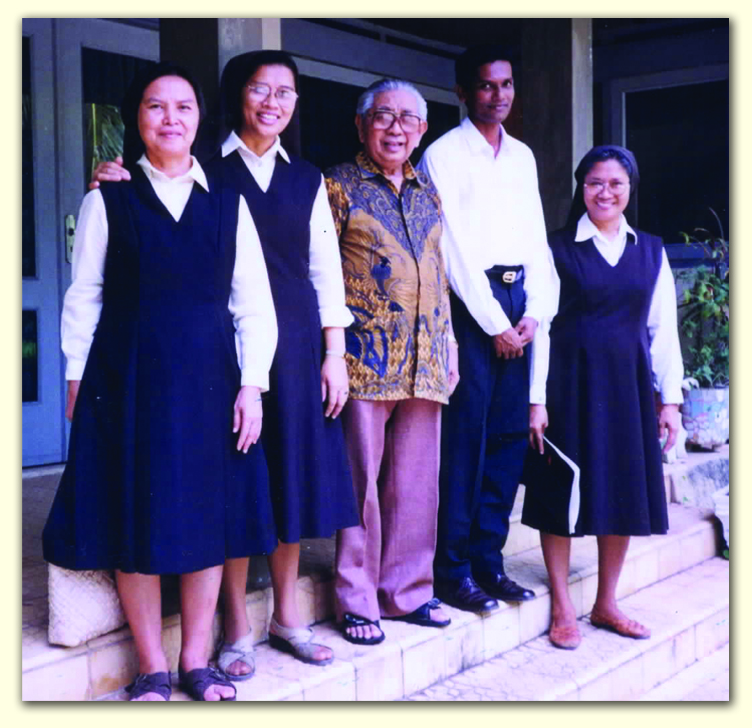
Courtesy call to Kupang Bishop
Archbishop Manteiro, who died the following October, officiated at the blessing of our first community house on 31 May 1997, the Feast of the Visitation. This was fitting because, as Sister Ma Fely affirmed, Mary, Our Lady of the Virtues, is the patroness of our mission in Indonesia and has responded with grace-filled surprises. Many religious men joined us in our thanksgiving to the Lord. We warmly welcomed our first eleven aspirants to realize the implanting of our charism. The house, named Rumah Sta Teresita, St Therese’s House, is located in Walikota, Kupang, accessible to transportation and near the parish church.
Growing in number
Carmelite and diocesan priests come here to celebrate Mass and hear the confessions of the community. They were our first staunch friends, supporters and benefactors in a time of great need. In God’s time, more young girls were attracted to what is truly characteristic of Missionary Carmel: prayer, silence, a family atmosphere where sisterly love is promoted, simplicity, joy, loving service for the Church and Marian devotion. Consequently, we grew in number and needed more formation houses.
Abundance of God’s blessings
We opened a house in Yogyakarta, the university belt of Indonesia, looking to the higher education of our young women in formation. We established our novitiate in Noelbake, Kupang. Our first house in Walikota, Kupang, remained as the postulants’ house and later became the Regional House with Sr Ester Padilla as the first elected Regional Coordinator. We found a house for our aspirants. The Lord continued with his surprises. More Sisters came on mission to Indonesia. The Semarang community was established for Catholic University Campus ministry. The newly-erected community in Pariti, Kupang, responds to the pastoral and educational needs of the parish of St Peter. With the help of a funding agency, we’re building a new novitiate in Kefamenanu more conducive to silence and solitude.
These ten years of the Lord’s surprises and wonders call for a celebration, as stated by our present Provincial Superior, Sr Lourdes Dizon. Indeed, there is another reason to do so, as our tenth year in Indonesia coincides with the 50th Anniversary of the presence of the Carmelite Missionaries in the Philippines.
Blessings abound
As we count the many blessings our Indonesian mission has received, we call to mind all the people whom God gave to us who have not left us alone in our struggle to be faithful to the mission entrusted to us. We thank them sincerely and fervently pray that God may bless them all according to the wealth of his loving kindness.
All is grace
Indeed, ‘from his fullness, we have all received grace in return for grace’ (John 1:16). What is our response to this abounding grace? To give thanks to God unceasingly and, in communion with all the Carmelite Missionaries of Father Francisco Palau Province (Philippines, Taiwan, Thailand and Indonesia), strive to enter into a relationship with the Father, the author and the source of all good and blessings, to be open to the transforming love of His Son, Jesus Christ and to be docile to the Holy Spirit, so that we can be continuously motivated by love in doing the mission entrusted to us.
You may write Sister Petronila at:
Fr Francisco Palau Community, Novisiat, Susteran Misionaris Carmelit, Jl Tim-tim Km 16, Noelbaki, KUPANG 85361, NTT INDONESIA
To Search is to Find

We do not have the answers to every question – maybe only a partial answer that could set you in the right direction. But the very asking of the question is the beginning of the answer. So why don’t you send us your questions and together we will search.
WHAT’S IN A WORD
What does the word ‘Catholic’ mean?
I have adapted this answer from a feature article by Steve Ray which you can find at Catholic Answers at www.catholic.com/thisrock/2005/0501fea4.asp and at www.catholicconvert.com, Steve Ray’s own website. He’s a former Evangelical Protestant involved now in full-time teaching in the Catholic Church as a writer and speaker.
The Word Catholic Defined
Catholic comes from the Greek katholikos, the combination of two words, kata (concerning), and holos (whole). The word ‘church’ comes from the Greek ekklesia, which means ‘those called out’, as in those summoned out of the world at large to form a distinct society. So the Catholic Church is made up of those called out and gathered into the universal society founded by Christ.
For roughly its first decade of existence, the Church was made up exclusively of Jews in the area of Jerusalem. But as the Church grew and spread across the Roman Empire, it incorporated Jews and Gentiles, rich and poor, Romans, freemen, and even slaves – men and women ‘from every tribe and tongue’. By the third century, one out of ten people in the Roman Empire was a Catholic. So the term ‘catholic’ was appropriated to describe the nature of Christ’s mystical body, the Church.
The first recorded use of the word is found in the writings of St Ignatius of Antioch, the second bishop of Antioch after St Peter. St Ignatius is known and revered as an authentic witness to the traditions and practice of the apostles. On his way to Rome, under military escort to the Coliseum, where he would be devoured by lions for his faith, he wrote, ‘You must all follow the bishop as Jesus Christ follows the Father, and the presbytery as you would the apostles. Wherever the bishop appears, let the people be there; just as wherever Jesus Christ is, there is the Catholic Church.’
Another early instance of the word ‘catholic’ is associated with St Polycarp, bishop of Smyrna, a disciple of the St John the Apostle. St Polycarp was martyred in the Coliseum in AD 155. In the Martyrdom of Polycarp, written at the time of his death, we read, ‘The Church of God that sojourns in Smyrna, to the Church of God that sojourns in Philomelium, and to all the dioceses of the holy and Catholic Church in every place.’
The same book says, ‘Polycarp had finished his prayer, in which he remembered everyone with whom he had ever been acquainted . . . and the whole Catholic Church throughout the world.’ They then gave him up to wild beasts, fire, and, finally, the sword. The epistle then concludes: ‘Now with the apostles and all the just, [Polycarp] is glorifying God and the Father Almighty, and he is blessing our Lord Jesus Christ, the Savior of our souls, and the Shepherd of the Catholic Church throughout the world.’
So we see that early in the second century, Christians regularly used the word ‘catholic’ as an established description of the Church. From the second century on, we see the term being used consistently by theologians and writers. One can conclude that ‘catholic’ was a very early description of the Church.
St Augustine, in the fourth century, relying on the tradition of the early Church, minces no words in asserting the importance and widespread use of the term: ‘We must hold to the Christian religion and to communication in her Church, which is Catholic, and is called Catholic not only by her own members but even by all her enemies’.
The early usage and importance of the word also can be seen in both the Apostle’s Creed and the Nicene Creed. If you were a Christian in the first millennium, you were a Catholic, and if you were a Catholic you recited the Creeds affirming the ‘one holy, catholic, and apostolic Church’.
TOUCH THERAPY
Why is touch important?
In St Mark’s Gospel, 5:21-43, a woman who had been ill for 12 years touched the cloak of Jesus and was healed. Jesus was on his way to the home of Jairus, whose 12-year-old daughter was gravely ill. When they got to the house the people said that she was dead. Jesus took the girl by the hand and said, ‘Talitha koum,’ ‘Little girl, get up.’
These are two among many examples of Jesus touching people and healing them.
Each culture has its own ways of showing respect and affection. For example, the Philippines and East Timor both have the ‘mano po.’ This is a form of touching. So is the handshake, which Westerners, more so than Filipinos, I think, use as a form of greeting and/or respect.
A Filipino priest who worked in Chile told me that he could never get used to the custom there of having to shake hands with everyone before leaving a party. Here we don’t leave without the ‘paalam’ of our host but not necessarily of everybody else.
I have come across Filipino men - and men in other countries too - who rarely, if ever, hug or kiss their children. I think that physical gestures of affection are very important in families. Each family has its own practices. Some persons are more ‘physical’ than others, which doesn’t make them more or less loving. But a baby who never gets cuddled, who is never held by someone loving, can die from lack of affection.
I think that most of us know when touching becomes improper or invasive. There are parts of the body that we instinctively protect and respect because of the place they have in God’s plan for marriage and family.
The area of ‘physicality’ is one are where there are cultural variations. But I do believe that a family where there are no outward signs of affection is missing out on something very important. Fathers or mothers who never hug or touch their children can seem very remote.
One of the characteristics of the late Pope John Paul II was his physical way of showing affection to both young and old, men and women. There are countless photos of this, some of them very moving.
What is very important is how the other person understands our gesture. For example, I’ve seen Western priests rejecting the hand of a child offering the ‘mano po,’ the Westerner reading it as a gesture of subservience, the child as a mark of respect. In this case the Western priest is always wrong. In Philippine culture the gesture is one of respect. Recently a friend, a married man who works with us, greeted me on his birthday with the ‘mano po’. I understood his gesture as partly one of respect to me, a priest and co-worker, but more as respect to God through my priesthood. It certainly wasn’t any form of subservience or ‘sipsip’.
Visit our Misyon website and send us your feedback misyononline.com
Email us at editor@misyononline.com
Your Turn

The author has since graduated from high school. She mentioned an article in the November-December 2002 issue. We are working to have all our back issues, from the first in September-October 1988, available online.
The main website of Couples for Christ is www.cfcglobal.org.ph/ . On the ‘Home Page’ under ‘CFC’s Seven Pillars’ click on ‘Family Ministries’ and you’ll find the link to the Youth for Christ page.
Dear Father Seán Coyle,
Greetings! I’m Charisse Flerida Pasaje and this is my first time to write a letter to a missionary. I’m a third year high school student at St Catherine’s College, Carcar, Cebu, run by Dominican Sisters (Congregación de Religiosas Misioneras de Sto Domingo).
Father, have you heard about Youth for Christ (YFC), one of the ministries of Couples for Christ (CFC)? I’m a member of the organization. We bring the youth closer to God through Youth Camps, Leadership Training and Prayer Meetings. We render our services for free. I would like to share an experience with my YFC group that I can never forget.
We were on a youth camp in Candabong, a mountainous area in the south of Cebu, and the team leader thought that it would lead to disaster due to many conflicts. First, we knew nothing about the exact location of the three-day youth camp, since we were unfamiliar with the place, and no one could lead us to our destination. Finally, after two hours of waiting and praying, help finally arrived. One of the couple-coordinators secured a jeep for us to proceed to the place. The road was very rocky, and when we reached the venue, one problem occurred followed by another. The venue was an elementary school with only two classrooms having electricity. We had to divide this space up for the boys’ quarters, the girls’ quarters, lecture and dining rooms. We had no clear knowledge where to get water. Another problem was that the YFC’s in Candabong had been unable to invite young people for the Youth Camp.
But then again, God is so good. He provided us with solutions. The two rooms were utilized for the boys’ and girls’ quarters and the latter was used as a lecture room during the day. We chose a room next to one of the two with electricity as the dining room. Even in the darkness of the night, the couple-coordinators found a bathroom beside the school and filled its tanks with water. At about 4:30pm young people began to arrive for the camp. That’s how things began to turn out fine.
I can say that it was the happiest camp I have ever served in, with the biggest number of participants and, despite the battalions of mosquitoes, the most beautiful bonding of us young people. During the entire camp, God was really there, for even if we failed in our first attempt, it suddenly turned out to be a success. There I learned the values of our theme for that year which was ‘Claiming the Promised Land’. At first, I thought that the venue would be beautiful then it turned out to be the unexpected. But later on, I said to myself, ‘What is there to claim if there is nothing to be claimed? If the venue is already perfect, then what is there to be changed?’ I’ve learned that He purposely placed our team in that land of scraps for our mission. In the end, together with the newly baptized Youths for Christ, we finally turned Candabong Elementary School into one of God’s Promised Lands.
We, in the CFC family, have our own magazine called ‘Laya’, but I also love reading Misyon. All the features are interesting, but I was mostly interested in your November - December 2002 issue, ‘The Great Slave Scam’ by Declan Walsh. It made me realize how lucky I am that even though we are not rich, God has blessed me with all the things I need for a comfortable life compared to those slaves in Africa suffering from maltreatment and hunger. I pray for them that God may take them out of their sufferings and bring them to His promised land.
Thanks a lot for your time, Father Coyle. I really appreciate you reading my letter and I hope that you enjoyed reading this epistle as much as I enjoyed writing it.
God bless to you and more power to the Misyon magazine!
Sincerely yours,
Charisse Flerida Pasaje
‘Welcome Home, My Little Star!’
By Heidi Lyn O. Veran
The author is a 22- year-old resident of Muntinlupa City. She dedicates this letter to her father and to all other fathers.
Dear Father,
When I was still in my mother’s womb, you set your plans for me. When I was born into this world, you had such high hopes for me just like you did for my other siblings. The first time you held me in your arms you felt your first bliss as my father. You called me your little star, for my eyes were big, round, shining and smiling. You would rock me to sleep, humming your gentle songs, while looking at me and dreaming about what I would become someday. You always said, ‘There’s my child,’ with your proud smile.
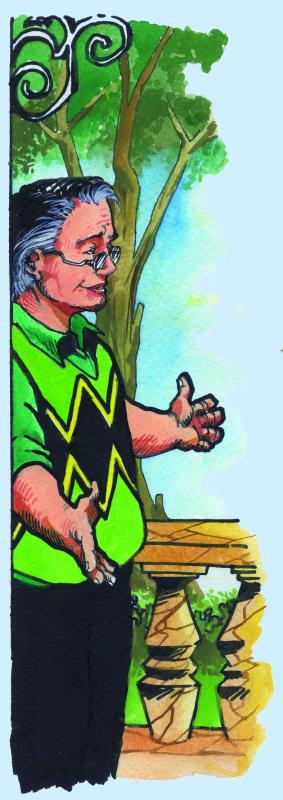
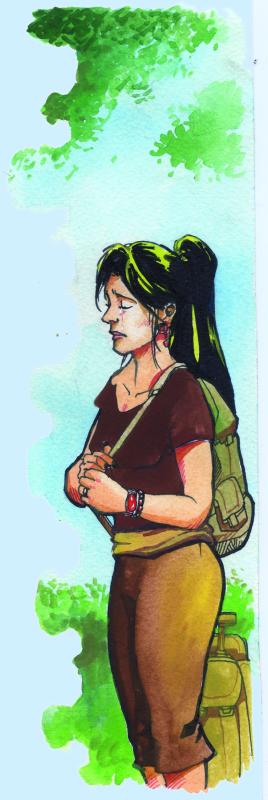
When I became a toddler, you always saw to it that I was well taken care of, especially when you weren’t around. You taught me how to walk and talk. It made you so happy when I did things perfectly. Then you sent me to school. I knew that was your first step to let me be on my own. I was frightened, but you gave me your soothing words of love and encouragement. You said that I must. I must make friends and I must learn about so many things I just can’t learn from home. You only said that soon, I will like school. Your words all came true. I began to like school. I made friends. I got great education. I made you so happy and proud of me. I’m so happy and proud of you too, Father. You gave me gifts and so many rewards for every good thing that I did. There was a time when I began to think of myself as a spoiled brat.
You loved, trusted and protected me so much. You were so afraid that my kindness and innocence would be abused by the outside world. You appointed my brother to protect and watch over me. But one day he failed and you punished him. Mother wept and felt so sorry for my brother because it was my fault. I fooled around. I began to wonder if Mother hated me. Of course, she did not. She was the bestmother ever.
In spite of all the good things you gave me, Father, one day, I ran away from home. I don’t know why I did it, I just wanted to. Maybe I was suffocated by too much love and too much protection. I hated you for making me so dependent on you. It was like you had me on such tight leash that I needed to escape. I asked myself, ‘Why did I always have to obey you? Is it because I am only your daughter?’ I ran away, determined to live my life without you.
It was hard. I thought you’d curse me for what I did so that I would never make it. There were times when I felt I had to go back to you but no, I had to stand alone. I had to survive, until I could show you that, indeed, I made it. I wanted to make it on my own because I wanted to hurt you.
But things change.
After two years, I returned home. Yes, I returned home. I remember that day vividly.
I was standing at the door. Thoughts were flooding my mind. My heart was pounding. I was standing there all mixed up with guilt, embarrassment, pride and even hatred. Part of me didn’t want to return home without proving something. I was so nervous, I wanted to walk away. But something was pulling me back. Maybe the door was not just a piece of wood separating the world of my future from the world of my past. Maybe behind that door was the answer I was seeking the past two years.
I continued to torment myself with these thoughts, getting more and more confused. I felt like shouting and crying. But I knew I had to do this. Sighing, I raised my hand like it was a mallet, ready to make the final judgment on my future. But before I could even tap at the door, it opened.
There you were, Father, astounded but smiling. And the words you said to me then, I can never forget. ‘I knew this time would come. I knew you’d come back home. I’m glad you have. We’ve missed you a lot. Welcome home, my little star.’ I expected that you punished me or rebuked me for being prodigal daughter. But there you were, embracing me, accepting me back and forgiving me. When you kissed my forehead like you used to, I know you still loved me. When you called me your little star, I knew that I was still your special one. When you embraced me and welcome me home, I was like a newborn baby cradled in your arms. I cried. Tears of surrendering, hurt, guilt, anger, fear. Most of all, I cried tears of joy. I knew I was forgiven.
That experience taught me a lot. It made me realize that the fulfillment in returning home was not because I was able to prove something. It was because when I returned home, you accepted me back, because you love me, even if I was wrong – reality wrong. I was wrong to hate you, to dislike the life you gave me. I was wrong to run away. It was I who made things complicated. I kept thinking about mu ‘freedom’ while you only thought about my welfare. You only gave me a good thing in life.
Thank you for your love. It has given me the real freedom that I should have. It has helped me grow; it has given me strength and has made me a better person. I learned all these things from you, and with that, I will always be your child, and you will always be my father, holding my hand, leading my way back home.
I’m glad to be home.
Your Little Star
‘We’re Kiwis’
By Father Bobby Gilmore
FOR MY FATHER
Our trivial fights
over spading
The vegetable patch,
painting the garden fence
ochre instead of blue,
And my resistance
to Armenian food
In preference
for everything American,
Seemed, in my struggle
for identity,
to be the literal issue . . .
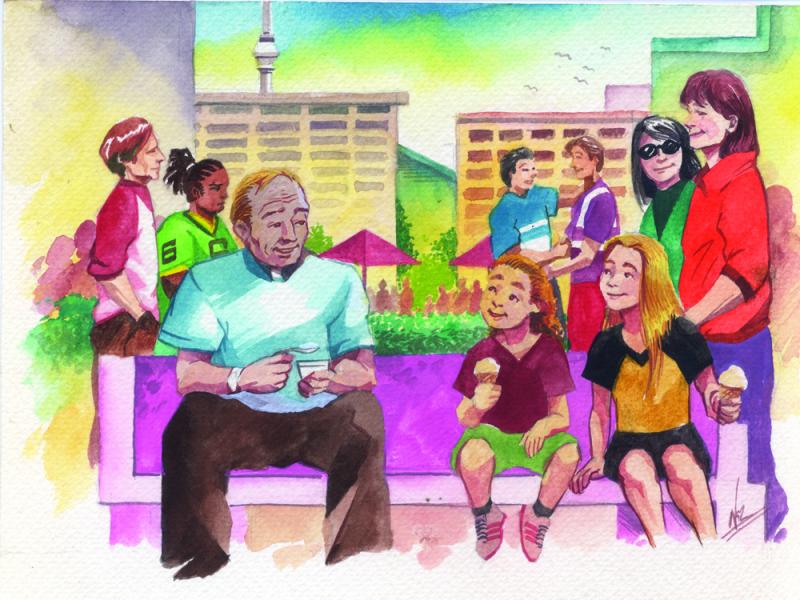
This poem, by the son of Armenian immigrants, directs a shaft of light into the hidden mesh of emotion and tension that is unconsidered in the lives of the uprooted as they try to re-root. Both Armenian father and American son are trying to express in an oblique way that which is near and dear to them. Both feel they are unheard.
When I began working in Britain, migrants from Ireland frequentlycommented that their children were of a different nationality, weren’t interested in things Irish and weren’t Catholics. They generally asked, ‘Where did we go wrong?’
Who am I?
I wouldn’t have been able to appreciate their feeling of loss were it not for an incident that happened some years previously in New Zealand. Sitting outside an ice cream café in Wellington with my two nieces, aged nine and ten, and seeing the wide variety of people passing up and down the street, I remarked on the presence of so many different nationalities in New Zealand. One of my nieces replied, ‘There are three in our house’. Asking who they were, I got the reply, ‘Mum is Australian, Dad is Irish and we’re Kiwis’. This was an aspect in the life of immigrants that I was totally unaware of. However, during the New Zealand/Australia cricket match on television the following week it was obvious who was who.
The experience of immigrant parents in coping with the ‘loss’ of the new generation, their sons and daughters, expressing their affiliation to different signs, symbols, values and a worldview is difficult to address and come to terms with. Of course many immigrants do not have time to reflect on these issues other than in passing regret and speculation. Seldom if ever have departing states or the arrival states of immigrants done anything to explain the momentous loss and change that is taking place in their lives that will continue into the future. States seem to see immigrants as objects of security rather than people who are experiencing a break in primary relationships.
Modern exodus
In the past, as is also the case at present, with some exceptions, immigration progresses from a rural village to an ‘edge’ city from which people migrate into a wider foreign world. They are in a threshold process with few, if any, external supports. Indeed, they are even perceived as suspect. The unfamiliar is threatening. In this situation, immigrants draw on their internal resources, central to which is religion. Generally, their religious belief, values and worldview have been determined for them by the overarching view of reality by village influences, customs and traditions.
A place for faith
Religion, which before may have been passive or functional, carried out under social pressure in their lives, now becomes central and its signs and symbols in high streets which were taken for granted now become beacons in the storm of their living on the edge of uncertainty. Religion and an awakening of national identity take central stage in immigrant lives and these are reinforced in the new destination by the networks of the ghetto, church, mosque and temple. Here there begins a longing to replace the overarching beliefs, values and traditions of the village they left behind.
A world of their own
This longing is reinforced if the religious leader is caught up in the same time wrap and tries to re-create the village with decor and doctrine irrelevant in enabling the new immigrants to access the new networks, the cultural norms, traditions and customs of their new world. As their village and national viewpoints are challenged by the discomfort of the indifferent and in some instances hostile, there is a tendency to view the new surroundings and people in negative ways. These negatives may have been imparted, nurtured and determined by biased historical, nationalistic and moralistic values that will lead to a rejection of the new rather than an understanding of it and relating to it with an appropriate faith expression that enhances one’s own and the new society’s well being.
Frequently, it is in such a negative scenario that immigrants settle and are determined by. Their longing for the past re-enforced in the present keeps them prisoners of the past rather than pathfinders. Fiction can easily become folklore at the expense of history.
However, even if economically comfortable, their greatest tension is yet to come. Naturally, immigrants settle, marry, have a family and the real tether of a mortgage.
What about the children?
Who will the children be? If they are born into an atmosphere of embellished decor, doctrine and culture from the village their parents left, the expectation will be to hope their children will be ‘like their brother’s and sister’s children back home’. However, the only comparison they can have of ‘home’ in the new situation will be the texture of their local church, temple or mosque and the tourist brochure picture that has been planted in their minds of ‘home’.
In modern times this is a major issue for many immigrant groups. The parents and elders of immigrant communities see little in their locale that befriends their worldview and as a result try to impose the beliefs, values and mores of the village they left on the new generation. This leads to further dislocation, distance and dissonance for the young who in trying to relate to their surroundings are caught between that and the mental surroundings their parents left but feel they have to impose. So, who do the new generation identify with?
Ties that bind
The tension between generations in migration is not new. Anyone who has observed international sports over the years can attest to that as generations of descendants of immigrants cheer for the teams of their parents or grandparents rather than the country of their birth. Not all of India’s supporters at Lords, the home of cricket in England, have come from Calcutta. Some of course also adopt the team of the land of their birth. Unfortunately, the depth of this generational dislocation, alienation and exclusion did not get the serious attention it should have got over the past half century, particularly in Europe. It took de-creative acts of terrorism worldwide to wake up to a conflict that immigrants were left to silently cope with over the years. In the past century how many radicals were cross-culturally grown?
But what these and other horrors also highlight is that immigrants and marginal groups were, and still are, dismissed as having nothing to contribute to the wider new societies they entered and settled in. Nevertheless, the painful truth is that these groups were the boxes that contained the seeds of future social, political and cultural developments.
On which the world rests
It is precisely because these groups were ignored over the years that John Reid, MP, Home Office Minister – justice minister – of the United Kingdom, and other political leaders internationally belatedly feel the need to understand the tensions in migration and do something constructive about integration generally but particularly in relation to ensuing generations. They need to accept that global policies affect the local soul.
Also, it should be kept in mind that for eighty-six percent of the world’s population, religion is important. Most of today’s immigrants think religion is important and they bring it with them to a Europe that is religiously bleached. Hopefully, both the old and the young can hear each other’s stories and will not have to transcend geography to form an identity. The hope is that they will feel at home where they are.
. . . Why have I waited
until your death
To know the earth
you were turning
Was Armenia,
the color of the fence
Your homage to Adana,
and your other complaints
over my own complaints
Were addressed
to your homesickness
Brought on by my English.
David Kherdian,
Armenian-American Poet